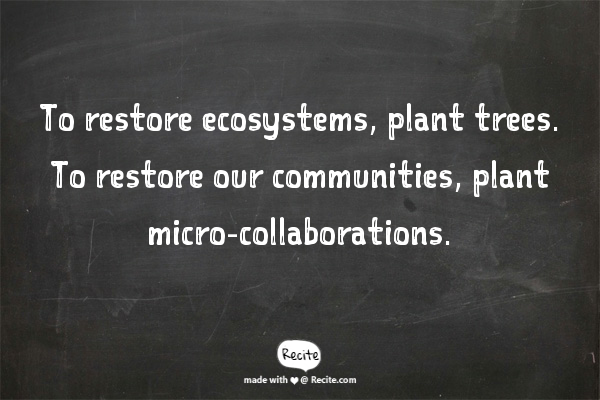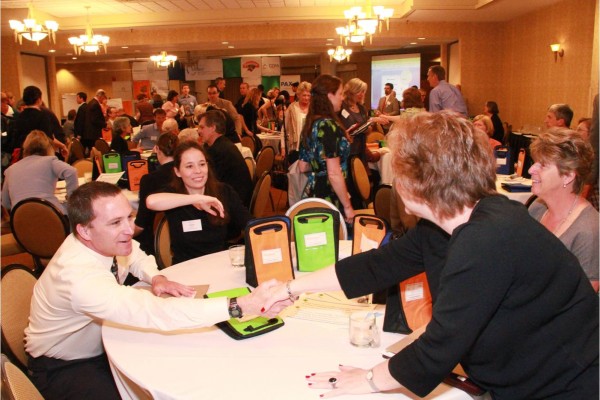 In a time when social media and larger forces are creating more division, pulling us apart from those who are different and rewarding “every man for himself” world views, we need friendship, co-creation, and circles of support to embody and model that another way is possible.
In a time when social media and larger forces are creating more division, pulling us apart from those who are different and rewarding “every man for himself” world views, we need friendship, co-creation, and circles of support to embody and model that another way is possible.
There are many ways to start this, from wherever you are. I am a junkie for expansive, fulfilling conversation with a friend or in small groups, so I am happy to share a big list of ideas, many of which I have used and can recommend:
- Enlist a friend or colleague to be your thinking partner or co-coach. Meet by phone or in person once a week. Each person gets a half hour to share what is moving or challenging for them. The other person listens, mirrors back what they heard, asks questions, or if desired, offers ideas. Re-evaluation counseling has a set of practices for this.
- Create a small group to meet regularly, like The Inklings. I was in one called the Life Balance Group and another called Wisdom Circle. We met once a month, making time to each check in at a deeper level with what was happening in our lives. We kept the conversation in a generative listening mode, reflecting back the one another’s strengths. Including a potluck with good food adds another fulfilling element to this.
- Start a peer learning group on some aspect of your work or life that you’d like to deepen or expand. Meet monthly to exchange ideas and challenges. Or start an Affinity Group: for example, a white person concerned about racism can create an Affinity Group to explore white privilege and structural racism. United to End Racism has a tool kit. Study circles are also a great process. The Northwest Earth Institute, with its courses on Choices for Sustainable Living or Voluntary Simplicity, was a big influence on my life.
- When you meet someone new in your work or community, take the initiative to meet up for coffee or lunch. Even with distance, one can use Skype video or phone to have great conversations. Last year I began a regular series of phone calls with someone a mutual friend introduced me to, who lives 1,500 miles from me. We have had some deep, wide-ranging conversations and learning together. We engaged in these calls for several months before we ever met in person.
- Host an inter-generational conversation or evening of storytelling. See The Circle Way. I recently had about 10 friends over for an evening of storytelling, with a simple prompt of “share a story of a woman you admired who had courage in challenging times.” I asked people to listen for what resonated in others’ stories and to share a few of these after, using a process from The Relational Center. The response from my friends was so positive – the stories were so moving and inspiring, and the quality of conversation fed us in a way that being on the computer or in work meetings just does not.
- When you have a challenging situation or transition to make, gather a Clearness Committee. This is a process the Quaker community uses where a small circle of friends will listen and ask you questions to help you get clearer.
- Host regular potlucks – see The Power of Potlucks as an example of how a local community’s entrepreneurs’ monthly potlucks led to many positive outcomes for their local food economy.
 With good design, meetings and gatherings can naturally enable people to find others to collaborate with. This is a list of my favorite methods. Please see our Resources page for links:
With good design, meetings and gatherings can naturally enable people to find others to collaborate with. This is a list of my favorite methods. Please see our Resources page for links:
- Closing Triangles Raffle
- 1-2-4-All for conversations, brainstorming, and reflection.
- World Café
- Open Space
- Circle process
- Mapping Who is in the Room
- Network mapping using Kumu or SumApp.
- Meeting rooms set up with small group tables, rather than classroom or U style.
- Good food with spacious coffee breaks and lunch breaks. (Skip the lunch time keynote speakers!!)
- Off-site retreats with time for people to casually interact, play, get outside, and connect in various ways over a longer stretch of time…away from their workplace and ideally apart from their smart phones.
Feeding Our Primary Needs
When I reflect on what has enabled me to do my best work, navigate the challenging times of my life, and live and work for values I believe in, it is friendship. How can we use the power of friendship as an intentional strategy and method of working for change in the world? I know “be the change” is an overused phrase, but it is the case here. We can work in ways that restore and nourish us at a deep level, as we do the work. Francis Weller, in this article on The Geography of Sorrow, writes about the “primary satisfactions” we fundamentally need:
We are living in what writer and cultural critic Daniel Quinn calls the Great Forgetting. Many of us have forgotten that we’re a part of an ecosystem, a watershed. We’ve forgotten that we’re kin to all the other animals. We’ve forgotten that we need each other. We have forgotten what I call the “commons of the soul.”
For thousands of years we were nourished by being members of a community, gathering around the fire, hearing the stories of the elders, feeling supported during times of loss and grief, offering gratitude, singing together, sharing meals at night and our dreams in the morning. I call these activities “primary satisfactions.” We are hard-wired to want them, but few of us receive them. In their absence we turn to secondary satisfactions: rank, privilege, wealth, status — or, on the shadow side, addictions. The problem with these secondary satisfactions is that we can never get enough of them. We always want more. But once we find our primary satisfactions, we don’t want much else.
Though primary satisfactions are rare in our culture, we do experience them. We can remember what that felt like and let our longing for that state become our compass, telling us what direction we need to go to get back to those satisfactions. We can find them through our friendships, by spending time in nature, by risking being vulnerable with someone we trust.
Let’s make this the time of Great Remembering, where we reconnect and practice collaborating and interacting in ways that feed these primary satisfactions. The patterns and ways are there, ready for any one of us to seed them with an invitation to gather. I welcome hearing about any of these ideas you take up!

Exquisite resource, written with such heart. Thank you Beth, for your living, very embodied practice.